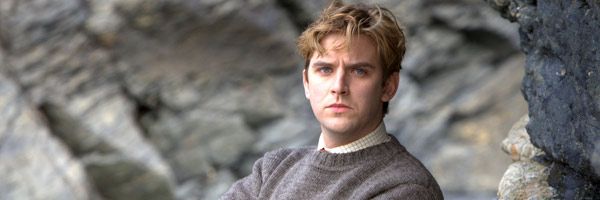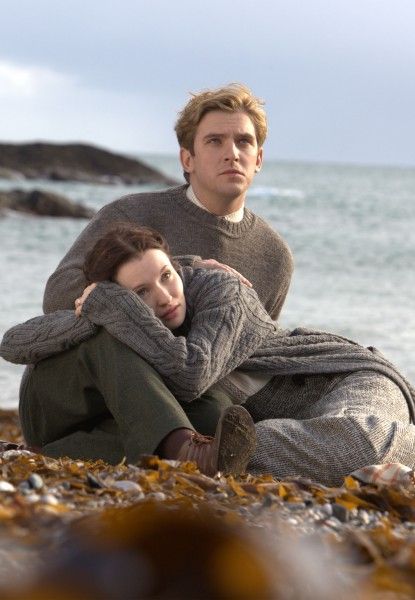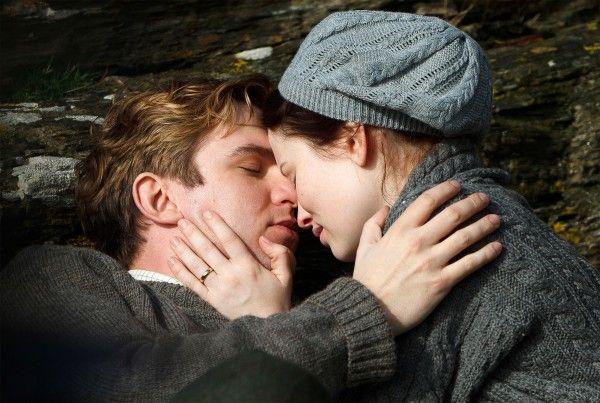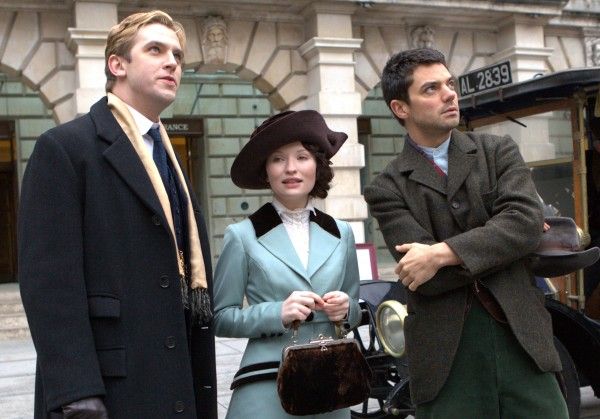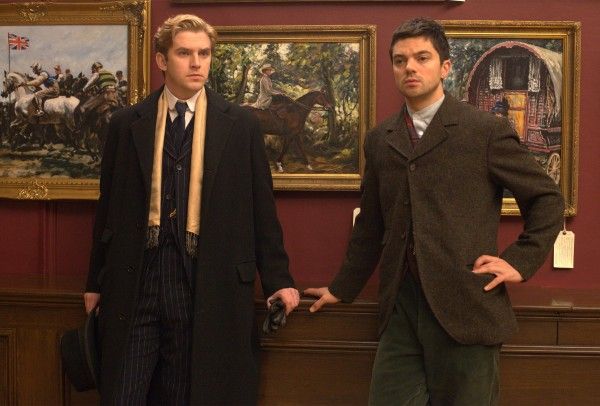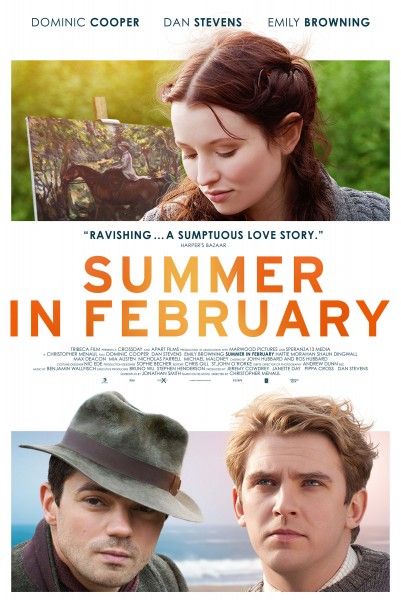Summer in February is a sweeping romance set at a bohemian artist colony on the picturesque coasts of pre-war England. Based on the true story of painter Alfred Munnings (Dominic Cooper), one of the premiere British artists of his time, and his blue-blood best friend Gilbert (Dan Stevens), the two very different men fall for aristocratic beauty Florence Carter-Wood (Emily Browning) and a love triangle quickly emerges with tragic consequences.
During this exclusive phone interview with Collider, actor Dan Stevens talked about how this film came about, that he’s been haunted by the characters in this story for half of his life, what drew him to the role of Gilbert, working with co-stars Dominic Cooper and Emily Browning, the comparisons between Gilbert and his Downton Abbey character Matthew Crawley, and what the fan frenzy has been like since the success of Downton. He also talked about how he came to be voicing the super-computer TIM for The CW series The Tomorrow People and whether he could ever physically appear on the show, what made him want to play Lancelot in Night at the Museum 3, the experience of working with Adam Sandler on The Cobbler, and what he looks for now in a project. Check out what he had to say after the jump.
Collider: When your old teacher wrote this novel and become something of a local celebrity when it came out, could you ever have imagined that you’d be here, all these years later, promoting the film’s release?
DAN STEVENS: No, not at all. It’s been such an amazing emotional journey, apart from anything else. I first read this when I was 15. As you said, there was a bit of a buzz around it, when it was published. That happens when a teacher at a school publishes a book. Everyone likes to make a little fuss about it, albeit on a small scale. Everybody I knew that read the book, at the time, said, “This would make a great movie.” But, I was 15 and didn’t really think “I’m gonna produce this movie, one day.” That’s not what was on my mind. Jonathan [Smith] had directed me in a lot of school plays, and he used to joke about, “Well, if my work ever gets made into a movie, you should play Gilbert. Ha ha ha!” And I would brush it off and not think anything of it.
And then, about seven or eight years later, he introduced me to this guy, Jeremy Cowdrey, who’s one of the other producers on the movie, and he was very, very passionate about the book also, and wanted to turn it into a movie. At the time, I was just starting out as an actor, and certainly was in no position to be producing a movie. But, we worked on the script and the story, and we developed it for about seven or eight years. And then, my career started to evolve and take off, a little bit, and it looked like it might be viable to actually make this thing. And so, about two years ago, we kicked into action, and the result is what you see. But, I’ve been with the story and haunted by the character of Florence for pretty much half my life. I haven’t been developing it that long, but it feels like it’s been with me a long time. It’s a passion project.
What was it like to have someone like Jonathan Smith in your life, especially in your younger, more formative years, and then to be working with him now, at this stage in your career? Do you have to take a minute to step back and see how weird the world can be sometimes?
STEVENS: Yeah. It got quite emotional on set, really, because we have come such a long way. He has been there at many, many stages of my life. He was very instrumental in nurturing my love of acting and my love of literature. He encouraged me to go to Cambridge because he thought it would be a good place for me to be. I didn’t know what he meant when he said it, but I got there and he was right. It was a brilliant place, and I met some amazing people there. We’ve remained friends for many, many years. So, when we finally got on that set, down in Cornwall, in the freezing cold on a beach, it was amazing to think about how far we’d all come. It’s not every teacher that you would necessarily go that extra mile for, but he’s a very, very special man. And it’s a very beautiful story, so I wanted to see it done as well as it could be. It was an amazing challenge.
What was it about Gilbert, as a character, that made you want to play him? Was that the only character you’d considered playing?
STEVENS: Yeah, I think it was always Gilbert. A lot of people have asked that, but I think I had more of an affinity with that kind of role for awhile. I’ve moved away from that a bit now. There’s quite a lot of that in Matthew Crawley, in Downton Abbey. It’s the sweet, noble creature who doesn’t always seize the moment. It’s a recurring character in a lot of classic literature, and you see it in a lot of drama. It’s this not quite Alpha male who is too nice and too polite for his own good. It’s also a very English character. So, I’d always been interested in portraying that, I guess, but I feel like I’ve done it a few times now.
Do you see Gilbert and Matthew Crawley as being cut from the same cloth, in that way?
STEVENS: It’s funny because Summer in February was around long before Downton was ever even conceived. I was developing this character, all along. And then, along came Downton, which was set in a similar and with a similar role, but I didn’t really think anything of it. But then, when we went to shoot the movie, I was like, “Oh, I’m in the same world.” And we were shooting it just before we shot Series 3 of Downton, so I was very much in Downton mode for it. But, they are very different. It moved away from this big house, upstairs/downstairs costume drama, and was more of a tragic love triangle, which could almost be set in any period. There is a timeless quality to those Bohemian artist colonies. They way they dress was a little more progressive. There’s a little more freedom and the boundaries were more blurred. That, for me, made it quite an appealing world to go into.
So, was there any overlap between the two projects?
STEVENS: There was a little overlap, actually. There was a two-week period where I think I got about six hours sleep, in the whole two weeks. Some of those scenes, in the early episodes of Downton Series 3, where I literally had to come overnight from Cornwall, rush onto set and get married to Lady Mary. It was quite full-on.
Was it strange to be simultaneously closing one chapter in your career while you were opening this new chapter of doing films, at the same time?
STEVENS: Yeah. Apart from a very hard working period, it was a very emotional period, as well. Saying goodbye to Downton was really hard, and not without its anxieties, of course. But, it also felt like an exciting thing to do. I was presenting myself with a challenge that I had to step up to, which is a good feeling.
Could you ever have imagined that there would have been the outcry that there was, when you left Downton?
STEVENS: No, not exactly. I didn’t know what to expect, really. At the end of the day, you just roll with the punches. It’s a testament to the character and the show, how much people cared about it. I think most people have moved on, but there are a few who almost make it a hobby to talk about it still.
Have you gotten used to the fan frenzy that’s followed you since the success of Downton, or is that something that’s just always a bit bizarre and surreal?
STEVENS: It can be a bit bizarre. It depends where you go. It depends entirely from person to person, how people are and how they react. I spend a lot of time apologizing to people’s wives for how upset I made them. But the way that show took off, I don’t think anybody could have predicted that. The reaction that all of us get, wherever we go, is still quite extraordinary. Most of the time, it’s lovely.
How was it to work with Dominic Cooper and Emily Browning on Summer in February, and play those different dynamics off each other?
STEVENS: They’re great! I’ve known Dominic for a long, long time, and I knew that he had the requisite roguishness that was wanted for Munnings. And Emily was sensational. She was a real revelation to me. I knew her a little bit from her work in Sleeping Beauty, but I hadn’t, at that stage, seen Sucker Punch. She really brought the mystery and the beauty and the depth that was required for that role. It’s a beautiful story about a woman who’s presented with a very, very difficult choice, and it is a choice that, albeit within the social structures of that day, but still presents itself to a lot of women and a lot of people, really. It’s about, “Do I go with Mr. Right, or do I go with Mr. Rock ‘n’ Roll, who is bad for me, but who seems like a fun escape?” Almost always, they go for the latter, which is almost always a bad idea. It just so happens that, in our case, it ends horribly tragically. But, there are positives and negatives to both of these men. She’s running away from something in London, and she’s fleeing to this very attractive Bohemian, progressive community. There are a lot of things up in the air for her, which makes it quite a complex role, and I think Emily did it beautifully.
How did you get involved with voicing TIM for The CW series The Tomorrow People?
STEVENS: They just approached me. There is still something in the American psyche that thinks super computers should have a British accent, but I was intrigued. It’s great fun! It’s a fun thing to do.
Has there been any talk about featuring you physically, in some way, or will you just always remain a disembodied voice?
STEVENS: I’m pretty sure it will remain disembodied. But, you never know with these things. These TV shows can take the strangest turns. But as far as I know, I will remain inside the machine.
What drew you to playing Lancelot for Night at the Museum 3? Is that just the ultimate in Hollywood make-believe?
STEVENS: Yeah. I’m a huge fan of those movies. I love the concept. I love the humor. I’m a huge fan of Ben Stiller, Owen Wilson, Steve Coogan, Robin Williams and Ricky Gervais. It’s an amazing group of actors who are comedic heroes of mine, all in one movie and all doing something that my daughter is going to be able to watch. And I’m playing a very, very fun role. It wasn’t a difficult decision. It’s a huge honor to be stepping up with those guys. It’s gonna be a lot of fun. I’m really, really looking forward to it.
And you also did The Cobbler with Adam Sandler?
STEVENS: Yeah, I’ve wrapped on that. That was a really interesting movie. Tom McCarthy directed it, and he’s a really, really brilliant director. It’s a very interesting combination with Adam. It’s an interesting experiment, that one. It could be really neat. It’s a very intriguing script.
The story seems to be so secretive, with that film. Is it even a comedy?
STEVENS: It should be! I don’t want to give too much away. You’ll see. I had a great time on it. It was amazing to work with Adam Sandler, who I’ve grown up admiring. I used to listen to his early radio show, when I was a teenager. That was quite extraordinary. And it’s got an amazing cast, with Steve Buscemi and Dustin Hoffman. It’s a really good group of guys, and Tom McCarthy was brilliant. It was nice to shoot on the streets of New York. It was exciting!
At this point in your career, what do you look for when deciding on projects you want to get involved with?
STEVENS: It’s the material, and then the people involved. When reading a script, it’s just got to light me up, in some way, whether it’s tragic drama or action thriller or dark comedy. Not all the scripts in all those genres will fire you up. It’s nice to get fired up when you read something. There have been a few this year, which is great.
Summer in February opens in theaters on January 17th.

